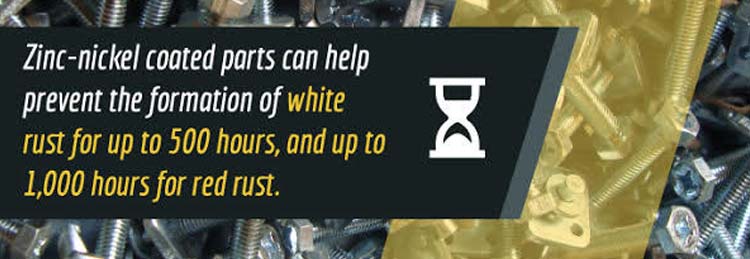
Zinc Nickel Alloy Plating
Why choose zinc-nickel plating?
Excellent corrosion resistance
Sacrificial
Cadmium alternative
Cost effective
5 to 12 micron coating thickness
RoHS compliant
What is Zinc Nickel Plating?
Zinc is often alloyed with other metals, which can result in improved performance than when plating with zinc alone.
Zinc-nickel plating involves zinc and nickel being co-electrodeposited on to components. Zinc-nickel plating can be passivated to further improve its corrosion resistance. The plated coating generally consists of 11 to 16% nickel and the remainder as zinc (many specifications allow a larger range, but best performance is usually found in this range).
Why Zinc Nickel?
For many applications zinc-nickel alloy plating is superior to standard zinc plating. Due to the complexity of zinc-nickel plating, it has only become cost effective in recent years as technology has improved. Zinc-nickel is now seen by many as an improvement on zinc plating and as an alternative to toxic cadmium plating.
TECHNO SHINE offer zinc-nickel plating at a variety of thicknesses. Unpassivated, clear passivated or black passivated finishes are available. Topcoats are also available.
Galvanic Corrosion
Zinc nickel bridges the galvanic gap between steel and aluminium, reducing the risk and rate of galvanic corrosion. In this way, it works similarly to cadmium. Zinc-nickel is still sacrificial and so provides some protection to the steel even in the event of small scratches, cracks etc.
More Corrosion Resistant Than Zinc
Standards for zinc-nickel plating typically require unpassivated parts coated with 10µm of zinc-nickel to withstand 500 hours or more of neutral salt spray testing before red corrosion. For comparison zinc plated and passivated parts of a similar thickness are expected to achieve only 120 hours - considerably less.
Zinc-nickel has good unpassivated corrosion resistance, although it can be improved even further with passivates and top coats. By comparison zinc plating is very reliant on the passivation and topcoating for protection. In this way, zinc nickel may perform much better than zinc for higher temperature applications (passivates lose this effectiveness at elevated temperature).
As a reputable surface treatment company, our zinc-nickel coatings are checked for composition and thickness on every production batch by XRF. This is critical to ensure parts perform as designed in service, but not offered as standard by all companies. Additionally, our coatings are backed by monthly salt spray testing to check corrosion resistance (per ASTM B117).
